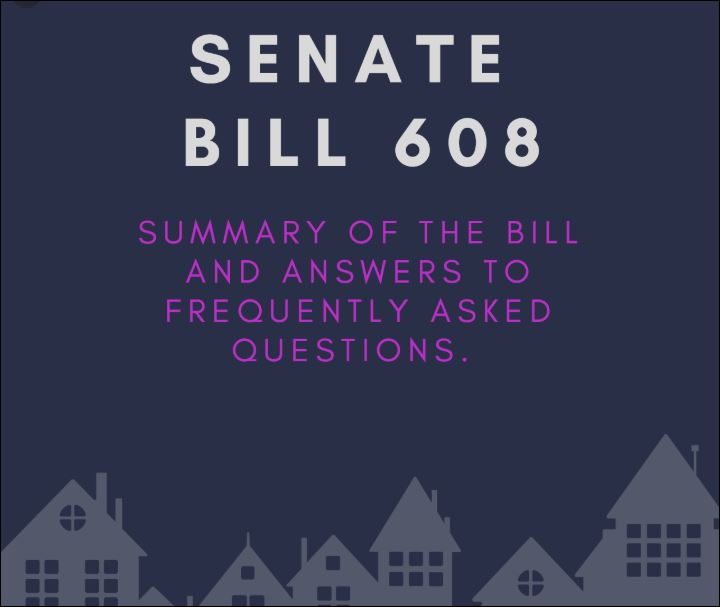Oregon’s new Senate Bill 608
-
by alcrone
- December 7, 2019
- Business, Oregon, Real Estate
- 0

Eviction Standards
Eliminates no-cause eviction standard after the first year of occupancy.
o Landlords can continue to evict for a tenant-based cause (current law – i.e., non-payment, violation of
the rental agreement, outrageous conduct, etc.).
• Adds new landlord-based for-cause reasons to evict a tenant:
o Sale to a person who will move in;
o Landlord or family member move-in;
o Significant repair or renovation of the unit;
o Removal of the unit from residential use.
• If landlord uses one of these four landlord-based reasons, they must provide the tenant with 90-day notice and
relocation expenses in the amount of 1 month’s rent.
Exceptions
• Small landlords (4 or fewer units) do not have to pay relocation expenses.
• Landlords who live on the same property as their tenant (owner occupied, 2 units or less) may still use a nocause
eviction at any time.
Month-to-Month Tenancies
• For the first 12 months of occupancy, a landlord may terminate the tenancy without cause with a 30-day notice.
• After the first 12 months of occupancy, a landlord may only evict a tenant for cause, by using an existing tenantbased
reason or by using one of the four new landlord-based reasons.
Fixed-Term Tenancies
• After the first 12 months of occupancy, the fixed-term lease will automatically roll over to month-to-month
unless the landlord has a tenant or landlord-based reason to terminate.
Exceptions:
• A fixed-term lease might not automatically roll over at the end of the fixed term per landlord discretion if
the tenant has violated the terms of the rental agreement 3 separate times during a 12-month period, with
written warnings for each violation given contemporaneously with the violation.
Annual Rent Increase
• Landlords may increase rent by no more than 7% + consumer price index in a 12-month period.
• Maintains current law regarding rent increases: prohibits rent increases in first year of month-to-month tenancy
and requirement that landlords give 90-day notice of rent increases thereafter.
Exceptions:
• New Construction: A landlord may increase the rent above 7% +CPI in a 12-month period if the certificate of
occupancy was issued less than 15 years ago.
• New Tenancy: If the previous tenant vacated the unit voluntarily or their tenancy was otherwise terminated in
compliance with other applicable law, the landlord may reset the rent on the new tenancy without limitation.
• Subsidized Housing: If the landlord is providing reduced rent to the tenant as part of a federal, state, or local
program or subsidy, they are exempt.
Enforcement
• If a landlord violates the new provisions, they are liable for three months’ rent plus actual damages.
2
SENATE BILL 608 SUMMARY
Frequently Asked Questions: SB 608
When will the changes go into effect?
Senate Bill 608 has an “emergency clause” and thus becomes effective once signed by Governor Brown. We anticipate
this could be as early as March 1, 2019.
If I have a transaction that closes after the law goes into effect, can the new owner evict the tenants?
Depends. Generally, you may only evict for a tenant cause or a “qualifying reason for termination” under of the
enumerated circumstances that the law provides.
Once you become an owner of qualifying rental property, you become a “landlord” whose conduct is governed by the
bill and you should review both the current law and existing tenant contracts of the property you’re purchasing.
However, the law does allow for specific circumstances under which a landlord, including a new landlord, could evict a
tenant landlord-based reasons including significant renovations, demolitions, safety, or owner-occupancy.
How does this impact closing timelines for rental occupied properties where the new owner will occupy the
residence?
The closing date in the sale of real property is a construct of contract law between the parties and thus would not be
affected by the new law which governs landlord-tenant relations.
However, displacing a current tenant (and thus effectuating the intent of new owner who would like to move-in) is
another issue (because notwithstanding the transaction between the buyer and the seller, the tenant has their own
rights subject to their lease agreement and current law).
If the tenant is a week-to-week tenant, or a month-to-month tenant within the first year, you have some flexibility to
displace them without cause (so long as you give them the specified amount of notice) and certain circumstances apply.
If the current tenant is a month-to-month renter who has been occupying for more than a year or is under a fixed term
lease, evicting a tenant is subject to more regulations. Fixed-term leases will always continue, unless there is a tenantbased
reason (failure to pay rent) for eviction. On a month-to-month tenancy, 90-days’ notice and the payment of
relocation expenses (1-month’s rent) will be required.
I heard that the law caps rent increases, but that cities and counties will be able to set high rent caps if they
want?
There are no exceptions for cities and counties, and therefore the rent increase cap would apply to the entire state
equally. Further, any local ordinances that conflict with the statewide cap on rent increases would likely be preempted
by the legislature’s acts. We advise seeking legal counsel to determine where estate and local laws may conflict and the
potential impact of such a situation.
3
SENATE BILL 608 SUMMARY
When it says that it applies to buildings 15 years or older, when does that date start? Is it rolling?
The time period is calculated by the difference between when a notice of rent increase is sent out and when a certificate
of occupancy was issued for the dwelling unit.
Does selling your home count as a for-cause or no-cause eviction?
The bill is intended to provided protections for tenants. Thus, if a home owner wishes to sell their home, this law would
have no effect on that transaction (which is between the buyer and the seller) unless the rights of a tenant are affected.
Fixed-term leases will always continue, unless there is a tenant-based reason (failure to pay rent) for eviction. On a
month-to-month tenancy of under a year, a no-cause notice may be issued with 30-days’ notice. On a month-to-month
tenancy of over a year, 90-days’ notice and the payment of relocation expenses (1-month’s rent) will be required.
I can help you with finding a great rental, just contact me at al@cronemiller.com or visit my site at www.homesforsalesalemoregon.net. Thanks and have a great day!




Join The Discussion